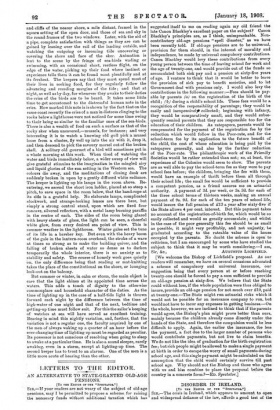ETTE RS TO _ THI E D
AN ALTERNATIVE TO STATE-GRANTED OLD-AGE PENSIONS:
[To THE EDITOR OF THE "Sezorwrosi
your readers are not weary of the subject of old-age pensions, may' I be permitted to propose a scheme, for raising 'the necessary funds without additional taxation which has
suggested itself to me on reading again my old friend the late Canon Blaekley's excellent paper on the subject? Canon Blackley's principles are, as I think, unimpeachable. Non- contributory old-age pensions "spell disaster," as we have been recently told. If old-age pensions are to be universal, provision for them should, in the interest of morality and independence, be made by universal compulsory contributions. Canon Blackley would levy these contributions from every young person between the time of leaving school for work and the age of twenty-one, and would provide out of the funds so accumulated both sick pay and a pension at sixty-five years of age. I venture to think that it would be better to leave the provision of sick pay to benefit societies, and to let Government deal with pensions only. I would also levy the contributions in the following manner :—Fees should be pay- able by parents (a) on the registration of the birth of the child ; (b) during a child's school life. These fees would be a recognition of the responsibility of parentage; they would be easily and inexpensivelp collected; beginning with infancy, they would be comparatively small, and they would subse- quently remind parents that they are responsible too for the education of their children. As ratepayers, parents would be compensated for the payment of the registration fee by the reduction which would follow in the Poor-rate, and for the school-term fee by its application to the future benefit of the child, the cost of whose education is being paid by the ratepayers generally, and also by the further reduction of the Poor-rate. The philanthropic work of the Friendly Societies would be rather extended than not; so, at least, the experience of the Colonies would seem to show. The parents are as well able to pay the school-term fee as they were to pay school fees before; the children, bringing the fee with them, would have an example of thrift before them all through their school life; the small fee would be sufficient to provide a competent pension, as a friend assures me on actuarial authority. A payment of 3d. per week, or 36. 3d. for each of the three school terms of thirteen weeks, making an annual payment of 9s. 9d. for each of the ten years of school life, would insure the full pension of 213 a year after sixty-five if the State allows 4 per cent. interest. But this payment takes no account of the registration-of-birth fee, which would be so easily collected and would so greatly accumulate; and whilst in the case of the poor generally this fee should be as small as possible, it might very profitably, and not unjustly, be graduated according to the rateable value of the house occupied by the parents. No doubt the scheme is open to criticism, but I am encouraged by some who have studied the subject to think that it may be worth considering.—! am, [We welcome the Bishop of Lichfield's proposal. As our readers will remember, we have on several occasions advocated a scheme of compulsory and universal insurance, our suggestion being that every person at or before reaching twenty-one should be forced to pay a sum sufficient to provide an old-age pension at sixty-five. We believe that the State could without loss, if the whole population were thus obligedlo insure, provide an old-age pension for not much over £10, paid at twenty-one.—The State might run actuarial risks which it would not be possible for an insurance company to run, but would not have to incur any expenses in getting business.—On the whole, however, we are inclined to think that if the parents would agree, the Bishop's plan might prove better than ours, mainly because the children already come directly under the hands of the State, and therefore the compulsion would be less difficult to apply. Again, the earlier the insurance, the less the payment, a fact due to the larger number, of persons who would contribute payments, but not live to claim benefits. We do not like the idea of graduation for the birth-registration fee; but rich people might be allowed to make a single payment at birth in order to escape the worry of small payments during school age, and this single payment might be calculated on the assumption that the child would certainly survive till past school age. Why should not the Bishop and those who agree with us and him combine to place the proposal before the country in a concrete form P—En. Spectator.]






































 Previous page
Previous page